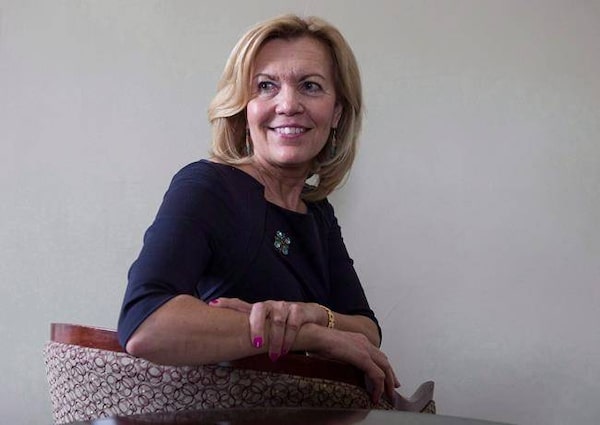
Christine Elliott is photographed in her office at Queen's Park in Toronto on Monday, April 13, 2015.The Canadian Press
Ontario Progressive Conservative party leadership candidate Christine Elliott says that if her predecessor can clear his name, he should be able to run for the party in the next election.
Patrick Brown resigned as Ontario PC leader late last month after being accused of sexual misconduct in incidents dating back years. He denounced the allegations, which have not been verified by The Canadian Press, as "absolute lies" in an interview with Postmedia, adding that he's contemplating legal action.
Elliott was the final of the three PC leadership candidates to address the annual Manning Networking Conference, but the only one to be asked directly about Brown by the moderator, journalist Anthony Furey.
"I think it's important for Patrick to come forward to say his view of what happened," Elliott said during a question-and-answer session at an annual conference for conservatives in Ottawa.
"I know he is trying to clear his name, if he is able to clear his name by the time the election comes forward then I would have no problem with him running as a candidate. But that has to happen before, in my opinion, he should be able to run."
Elliott was also asked several more pointed policy and current events questions than her competitors — longtime municipal politician Doug Ford and relative political neophyte Caroline Mulroney.
Among them, whether as someone who was appointed by current Ontario Premier Kathleen Wynne as the province's patient ombudsman, she's just part of the so-called Liberal swamp the Ontario PCs want to drain.
"Absolutely not," she said.
"I've always been a proud Progressive Conservative."
It's Elliott's third time trying for leadership of the PC Party; she lost to Brown in 2015 and to Tim Hudak in 2009.
A knock against her in the past had been her lack of political and leadership experience, but she said Saturday she has far more of both now than she did in the last leadership campaigns.
She said the key to her victory, and the party's at large come the provincial election, is to ensure everyone has a home in the Ontario PC Party.
That's Ford's goal too. He said Saturday he's confident he can translate a history of electoral success in Toronto into a win provincially, not just for leadership but for the Ontario PCs as a whole.
He cited his performance in Toronto's 2014 mayoral election — he raked in about 34 per cent of the vote, finishing second after John Tory. That, he suggested, bodes well for his potential to turn Toronto's typically left-leaning voters.
"We need those seats."
He'll win them not just on the backs of Ford Nation, the nickname given to the passionate supporters of Doug and his late brother Rob.
It's thanks to them that Fords have represented a suburban Toronto riding for years, and it's because of them he'll run no matter what in 2018, he said.
But attracting NDP and Liberal voters are also key, he said, as he claimed that much of the PC Party base comes from the left.
"Don't count out hardworking union people as being fiscally conservative," he said.